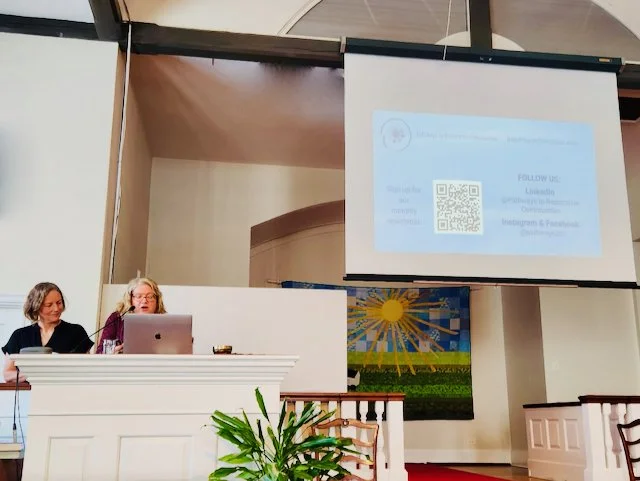Restorative Justice, Civic Thriving, and Dr. King’s Beloved Community
We think of Restorative Justice as a tree. The roots are the underlying values and the goals of the Beloved Community. The trunk is made up of the structures that help us embody those values: Restorative Practices, the 18 Civic Learning Journeys, and Dr. King’s six steps for nonviolent social change. Acting with these structures as guides leads to the tree’s canopy, where we have healing, belonging, and community, which ultimately moves us closer to the Beloved Community of Dr. King’s vision.
The Differences and Similarities of Restorative Justice and Mediation
Mediation is only one pathway to conflict resolution. An alternative approach, the Restorative Justice approach, centers the relationship itself—ensuring that every person involved is treated with dignity, listened to fully, and given space to share how they have been affected. This restorative model broadens the focus beyond just solving the problem to repairing harm, rebuilding trust, and supporting the well-being of everyone involved.
Integrating Restorative Practices and PBIS: The System and the Heart
PBIS tells us we need consistency and clear expectations. RP gives us circles, routines, and language that make those things real.
Both PBIS and RP want the same outcomes:
Positive school climate
Students staying in the classroom
More instructional time
Fewer behavior referrals
Stronger relationships between teachers and among students
PBIS helps us measure whether it’s working. RP helps us make it work in a way that builds community.
Education Reform Comes Full Circle: The Roots of Restorative Practices in Progressive Education
For over 100 years educational thinkers have returned to the ideas of doing “with” rather than “to” students; the importance of community; teaching the whole person; and thinking critically about issues of power and oppression.
Leading with Connection: How Restorative Circles Transform School Culture and Student Behavior
Circles are not a warm-up or a side activity. They’re essential infrastructure. When we create space for students and educators to connect, reflect, and be human together, we grow the conditions for deep learning and joyful community.
The Boy Crisis in Schools: How Restorative Practices Support Learning Through Connection
Our school schedules—rigid, fast-paced, test-driven—aren’t neutral. They often reinforce old norms and leave little room for the kind of relationship-centered work that best supports students. This is a disservice to all students, but it disproportionately harms boys—especially Black boys—who are being left behind across multiple educational measures.
Restorative Practices and Resilience: How Connection Protects Marginalized Students
Youth living with socially devalued characteristics (minority sexual orientation, race, ethnicity, disability, obesity) experience frequent stigma-based bullying, leading to feelings of shame.
Restorative Conversations in Schools: Strategies for Supporting Reluctant Teachers
This past month, we addressed how to encourage buy-in to Restorative Conferences, for both teachers and students, and for both responsible and harmed parties. A combination of training, practice, and exposure can increase buy-in for any reluctant person.
Experiential Learning as Restorative Pedagogy: Building Community and Engagement in Schools
Our communications manager Rachel Saudek has a really cool day job. She has been working for a sailing non-profit in the San Francisco Bay that brings students from all over the Bay Area out to experience life on the water and learn about their local ecology from a new perspective. During one of our Zoom meetings, we three mused over the many connections between experiential learning and the Restorative approach, and this blog was born.
From Local Initiatives to National Reach: How P2RC Expanded Restorative Practices
Restorative Justice/ Practices provide tools to address one another when we don’t agree, as well as providing opportunities to create a sense of community among circle participants. The growing interest in these practices gives me hope.










